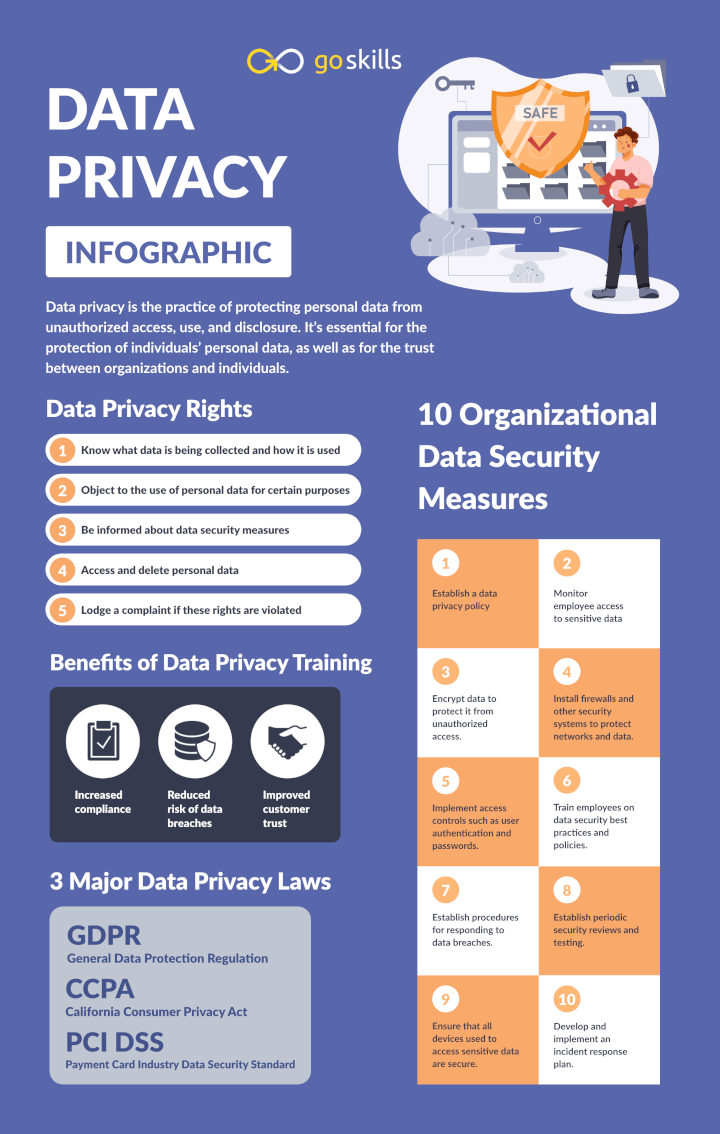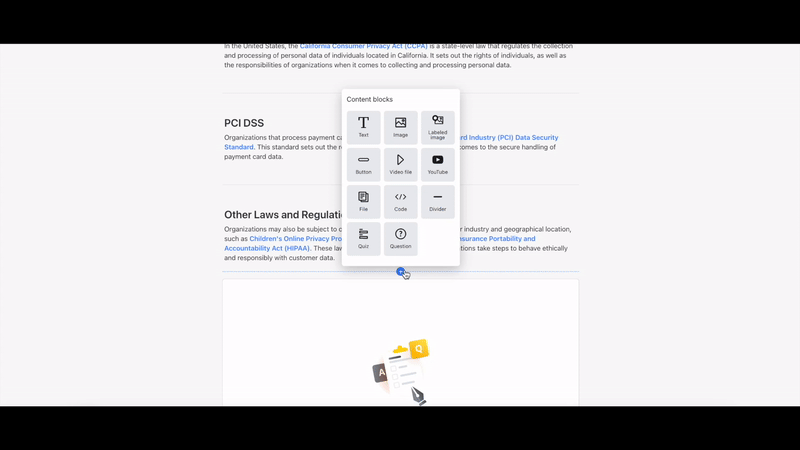From our internet browsing habits to the use of GPS to our social media contacts, our personal data is constantly being generated and shared. This reality has made the concept of data privacy increasingly important. But what exactly is data privacy? It refers to the protection of an individual's personal information: ensuring that it is collected, stored, and used in a manner that respects their rights and maintains their confidentiality. This is of crucial importance, especially with the growing prevalence of data breaches and privacy violations.
Data privacy holds immense importance in the digital age for several reasons. First and foremost, personal data is highly valuable and sensitive, putting it at risk of cybersecurity attacks. It includes information such as names, addresses, financial details, health records, and online activities, which, if exposed or mishandled, can lead to identity theft, financial loss, and reputational damage. Protecting personal data is not just about individual privacy but is also essential for maintaining trust in the digital ecosystem.
Additionally, data privacy is a non-negotiable for businesses that operate in the digital ecosystem, especially those that collect big data. It holds information about their clients, their operations, and employee information. Organizations that undermine cybersecurity threats may put themselves at risk for serious consequences that affect them, their clients, and the future of their company.
Protecting personal data is not just about individual privacy but is also about maintaining trust in the digital ecosystem.
Personal data and its significance
Personal data is any information that can be used to identify or contact an individual. It includes names, addresses, phone numbers, email addresses, social security numbers, financial records, medical information, IP addresses, and even online identifiers like cookies and device IDs. In our highly digital society, personal data has become a valuable asset for businesses and a target for cybercriminals.
The significance of personal data lies in its potential for misuse and abuse when it falls into the wrong hands. This information can be exploited for identity theft, fraud, phishing scams, targeted advertising, and other malicious activities. Moreover, personal data can reveal sensitive aspects of an individual's life, including their habits, preferences, beliefs, and associations.
Risks associated with inadequate data privacy
Insufficient data privacy measures can expose individuals and organizations to significant risks. The most obvious risks associated with inadequate data privacy include:
- Data breaches: When personal data is compromised due to unauthorized access or hacking, it can have severe consequences. Data breaches can result in financial loss, reputational damage, legal penalties, and loss of customer trust. Incident response plays a critical role in mitigating the damage caused by such breaches, helping organizations quickly identify and contain the threat.
- Identity theft: Personal data, such as social security numbers and financial records, can be used by criminals to steal identities and commit fraudulent activities, leading to financial ruin and emotional distress for the victims.
- Cybercrime and fraud: Inadequate data privacy can facilitate cybercriminals in carrying out various forms of fraud, such as phishing, ransomware attacks, and unauthorized financial transactions. This can result in financial losses for individuals and organizations alike.
- Reputational damage: Mishandling personal data can tarnish the reputation of an organization. News of data breaches or privacy violations can spread rapidly, eroding customer trust and loyalty and causing long-term damage to the brand image. To protect your company from this, you can use a residential proxy. Residential IPs are great for identifying threats, testing applications, or monitoring websites in different locations.

Real-life examples of data breaches and their consequences
Numerous high-profile data breaches have occurred in recent years, underscoring the real-life consequences of inadequate data privacy. Here are a few notable examples.
- Equifax Data Breach (2017): One of the largest data breaches in history, the Equifax breach exposed the sensitive personal information of approximately 147 million customers, including their social security numbers. This breach led to a loss of trust in Equifax, legal repercussions, and a significant financial impact on affected individuals.
- Facebook-Cambridge Analytica Scandal (2018): Cambridge Analytica, a political consulting firm, obtained personal data from millions of Facebook users without their consent. This breach raised concerns about data privacy, political manipulation, and the ethical implications of targeted advertising.
- Marriott International Data Breach (2018): The breach exposed the personal information of approximately 500 million guests. Exposed data included their passport numbers and credit card details. This incident highlighted the vulnerability of the hospitality industry to cyberattacks and the importance of safeguarding customer data.
- LastPass Security Breach (2022): In 2022, LastPass, a password manager with over 30 million subscribers, notified its users of a security incident where an unauthorized third party used a compromised developer account to access the password manager’s source code. Later in 2023, there was another security breach announcing that a malicious party was able to gain access to some elements of customers’ information.
These examples demonstrate the far-reaching consequences of data breaches, including financial losses, legal repercussions, erosion of trust, and the need for stricter data privacy regulations.
Definition and purpose of data privacy training
Data privacy training refers to educational programs and training initiatives aimed at increasing awareness and understanding of data privacy principles, best practices, and legal requirements. In short, it’s about training people to handle data correctly.
Data privacy training aims to equip individuals and organizations with the knowledge and future skills necessary to handle personal data responsibly and to ensure compliance with data protection laws.
Data privacy training programs provide an understanding of the importance of data security, the risks associated with mishandling personal data, and the measures needed to protect it. A good data privacy training program will typically cover topics such as data protection regulations, data classification, and handling, consent and permissions, data breach response, and privacy by design principles.
Customized training for your team
Access course templates with a GoSkills business account — no credit card required!
Check out the templates4 benefits of data privacy training for individuals and organizations
Data privacy training offers several benefits for both individuals and organizations:
1. Enhanced awareness: Data privacy training increases awareness about the value and sensitivity of personal data. Individuals learn to recognize potential risks and make informed data sharing and protection decisions. Organizations gain a workforce that understands the importance of data privacy and can actively contribute to maintaining it.
2. Compliance with data privacy laws: Training programs ensure that individuals and organizations know the legal requirements and obligations regarding data privacy. By understanding the applicable laws, such as CCPA and GDPR, organizations can implement necessary policies and procedures to remain compliant and avoid penalties.
3. Mitigation of risks: Adequate data privacy training helps mitigate risks associated with data breaches and privacy violations. Employees who are knowledgeable about data privacy principles and best practices are better equipped to handle personal data securely, reducing the likelihood of accidental or intentional data breaches.
4. Protection of reputation and trust: By prioritizing data privacy training, organizations demonstrate their commitment to safeguarding personal information. This fosters trust among customers, clients, and partners, enhancing the organization's reputation and competitive advantage in the market.

Overview of data privacy laws
Data privacy laws are legal frameworks designed to regulate the collection, use, storage, and sharing of personal data. These laws aim to protect individuals' privacy rights, promote transparency in data handling practices, and establish accountability for organizations that process personal information.
In an increasingly interconnected world where personal data is constantly exchanged, data privacy laws play a crucial role in safeguarding individuals' rights and fostering trust in digital interactions.
The California Data Privacy Law (CCPA)
The California Data Privacy Law, also known as the California Consumer Privacy Act (CCPA), was implemented in 2020 and is among the most comprehensive and well-known data privacy laws in the world. The CCPA grants residents California, USA specific rights over their personal information and imposes strict regulations on businesses that handle this data.
The main provisions of CCPA include:
- The Right to Know: Individuals have the right to know what personal information businesses collect, how they will use that information, and whether it will be sold or disclosed to third parties.
- The Right to Opt-Out: Individuals can opt out of the sale of their personal information and direct businesses to delete their data.
- The Right to Non-Discrimination: Businesses are prohibited from discriminating against individuals who exercise their privacy rights.
- Enhanced Privacy Disclosures: Businesses must provide clear and transparent privacy notices detailing what type of personal information is collected and how it will be used.
The CCPA has significant implications for both businesses and consumers. For businesses, compliance with the CCPA requires implementing mechanisms to respond to consumer requests, ensuring transparency in data practices, and updating privacy policies to align with the law's requirements. Non-compliance with the CCPA can lead to substantial penalties and legal consequences.
For consumers, the CCPA provides greater control over personal information, allowing them to make informed decisions about its use. It enhances transparency regarding data collection and sharing practices and empowers individuals to exercise their rights to access, delete, and opt out of the sale of their data.
General Data Protection Regulation (GDPR)
The General Data Protection Regulation (GDPR) is an extensive data protection law that came into effect in the European Union (EU) in 2018. The GDPR applies to all EU member states and regulates the processing of personal data within the EU, as well as the transfer of personal data outside the EU.
Key principles and rights under the GDPR
The GDPR is built on several key principles, including –
- Lawful basis for processing: Personal data must be processed based on specific legal grounds, such as consent, contractual necessity, legal obligations, or legitimate interests.
- Data minimization: Organizations must collect and retain only the necessary personal data for the intended purpose and ensure it is not kept longer than necessary.
- Individual rights: The GDPR grants individuals rights such as the right to access their data, rectify inaccuracies, erase data, and object to processing in certain circumstances.
- Accountability and transparency: Organizations are required to maintain records of their data processing activities, implement appropriate security measures, and provide individuals with clear and understandable privacy policies.
5 elements of an effective data privacy training program
When deciding on a data privacy training program for your team, the following key components must be included so that you get the best return on your investment:
1. Tailored approach: Training programs should be tailored to the specific needs and roles of the participants. Different departments or job functions may have varying responsibilities and risks concerning data privacy. Customizing the training content ensures relevance and maximizes the impact of the program.
2. Comprehensive content: Training development programs should cover essential topics related to data privacy, including the definition of personal data, data protection laws, privacy principles, data breach response protocols, and practical guidelines for secure data handling.
3. Regular updates: Technology, regulations, and best practices evolve over time (as they should!). Training programs should be regularly updated to reflect the latest developments and ensure ongoing compliance with changing requirements.
4. Engaging delivery methods: Data privacy training should employ engaging and interactive delivery methods, such as workshops, simulations, case studies, and gamified quiz questions. This helps participants better understand and retain the information, fostering a culture of data privacy within the organization.

5. Ongoing reinforcement: Data privacy training should not be a one-time event. Regular refresher courses, reminders, and communication channels should be established to reinforce data privacy principles and encourage continuous learning.
Want to boost your team's success?
Learn why training and development matters (and how to do it right)!
Key takeaways
Data privacy has become a critical concern in the digital age. Knowing that their personal information is protected is an essential element in preserving individuals' rights, maintaining trust, and preventing the potential risks associated with data breaches and privacy violations.
To further support the understanding and implementation of data privacy best practices, GoSkills offers a content-ready, fully customizable training template on the importance of data privacy. This course forms the basis for the knowledge and skills employees need in order to handle personal data responsibly, comply with data protection regulations, and mitigate risks.
By using the GoSkills training template, individuals and organizations can actively contribute to creating a privacy-centric culture and protecting personal data. Together, we can foster a safer and more secure digital environment where the privacy of personal information is respected and protected.
Customized training for your team
Access course templates with a GoSkills business account — no credit card required!
Check out the templates



